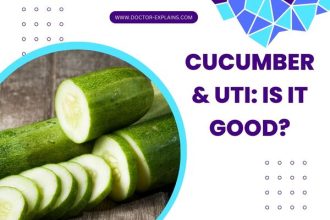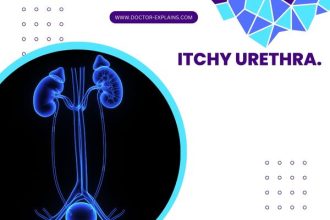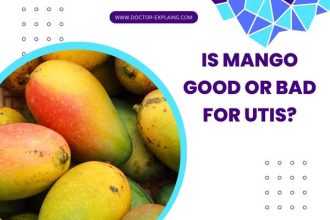Urinary Tract Infections (UTIs) are a common health issue, and many people seek natural remedies to complement their prescribed treatments.
One such remedy that has gained attention is pineapple.
In This article, I’ll explore six evidence-based facts about pineapple and UTIs and my personal conclusion as a kidney doctor to help you make informed decisions.
The Short Answer:
Pineapple is not a proven treatment for UTIs, but it contains certain compounds that may be beneficial for overall health and inflammation. It is generally safe to consume pineapple in moderation during a UTI, but excessive intake may lead to bladder irritation for some individuals. Additionally, the bromelain found in pineapple may interact with specific UTI antibiotics.
What you need to know:
Here’s a quick summary of the key points covered in this article:
- Pineapples are not a proven treatment for UTIs.
- There is no specific recommendation for or against the use of pineapple in UTI.
- They contain bromelain, a potent anti-inflammatory.
- Excessive pineapple consumption may irritate the bladder during a UTI.
- It’s safe to eat pineapple in moderation.
- Bromelain may interact with certain UTI antibiotics, like amoxicillin.
- There are other fruits that may be beneficial for UTIs.
Fact [1]: Pineapples are not a proven treatment for UTIs
While nutritious and delicious, pineapples are not scientifically proven to treat or prevent UTIs. After reviewing the major guidelines for UTI treatment and prevention, I’ve found no specific mention of pineapples as a treatment or prevention for UTI (reference).
UTIs are typically caused by bacteria, and the most effective treatment is often antibiotics prescribed by a healthcare professional.
Although some natural remedies may support overall health and potentially help with UTI prevention, pineapple should not be considered a substitute for proper medical care.
Fact [2]: Pineapples Contain Bromelain (an excellent Anti-inflammatory)
One of the key components in pineapple is bromelain, an enzyme known for its anti-inflammatory properties (reference).
Bromelain has been studied for its potential benefits in reducing inflammation and promoting overall health.
Bromelain is not a specific treatment for UTIs. However, its anti-inflammatory properties may help alleviate some discomfort associated with UTIs and support the body’s natural healing process.
Here is a summary of the major benefits of Bromelain found in Apples (reference)
| Benefit | Description |
|---|---|
| Anti-inflammatory | May help reduce inflammation and swelling, particularly in conditions like osteoarthritis, sinusitis, and injuries. |
| Pain relief | May provide relief from pain and discomfort associated with injuries, surgery, and arthritis. |
| Improved digestion | Bromelain’s proteolytic properties may aid in breaking down proteins and improving digestion and nutrient absorption. |
| Sinusitis relief | Studies suggest bromelain may help reduce nasal inflammation, thin mucus, and improve symptoms of sinusitis. |
| Enhanced recovery after surgery or injury | Some research indicates that bromelain can help reduce swelling, bruising, and pain following surgery or injury. |
| Cardiovascular health | Limited studies suggest that bromelain might have a positive effect on blood clotting and circulation. |
Fact [3]: Excess pineapples may irritate your bladder during UTI
Pineapples are acidic fruits, and some individuals may be sensitive to their high acidity levels. Consuming excessive amounts of pineapple or its juice can potentially exacerbate bladder irritation and worsen urinary symptoms during a UTI. If you experience discomfort after eating pineapple or drinking its juice, it may be best to limit your intake or avoid it altogether during a UTI.
Fact [4]: You can eat pineapples but in moderation
For most people, eating pineapple or drinking its juice in moderation is unlikely to cause harm during a UTI.
Pineapples are rich in vitamins, minerals, and antioxidants that can contribute to overall health. It’s essential to listen to your body and adjust your intake accordingly, particularly if you experience bladder irritation or worsened symptoms after consuming pineapple.
Fact [5]: Bromelain (in pineapples) may interact with UTI antibiotics (such as amoxicillin)
Bromelain may interact with certain medications, including antibiotics commonly prescribed for UTIs, like amoxicillin (reference). This interaction can potentially reduce the effectiveness of the antibiotic, making it less efficient at treating UTIs.
Bromelain is found in small amounts in Pineapple and pineapple juice compared to bromelain supplements. Eating small amounts of pineapples doesn’t typically lead to interactions.
Bromelain Concentration in Supplements and Natural Sources
| Source | Bromelain Concentration |
|---|---|
| Pineapple fruit | Varies depending on the part of the fruit; the stem contains the highest concentration, followed by the core and then the flesh. |
| Pineapple juice | Lower concentration compared to the fruit, as it is diluted and often contains less of the bromelain-rich stem and core. |
| Bromelain supplements | Concentration varies by product; supplements typically provide a standardized amount, ranging from 500 to 3,000 MCU (milk clotting units) or GDU (gelatin dissolving units) per serving. |
If you are taking antibiotics for a UTI, consult your healthcare provider before consuming large amounts of pineapple or taking bromelain supplements to ensure your treatment remains effective.
Fact [6]: Fruits that are good for UTI
While pineapple may not be a specific UTI remedy, other fruits have been studied for their potential benefits in preventing UTIs. Some of these fruits include:
- Cranberries: Rich in proanthocyanidins, which may help prevent bacteria from adhering to the urinary tract.
- Blueberries: Similar properties to cranberries, may help prevent bacterial adhesion.
Including a variety of fruits in your diet can support overall health and potentially help prevent UTIs by promoting a healthy immune system and urinary tract.
FAQs
Can I take Bromelain (pineapple extract) with UTI?
Bromelain supplements may provide some anti-inflammatory benefits but are not a proven treatment for UTIs. Consult your healthcare provider before taking bromelain supplements, particularly if you are on antibiotics for your UTI, as there may be potential interactions that could affect the effectiveness of your treatment.
Does Pineapple make UTI worse?
For most people, moderate pineapple consumption is unlikely to worsen UTI symptoms. However, individuals sensitive to acidic foods may experience bladder irritation or worsened symptoms after consuming pineapple. It’s essential to listen to your body and adjust your intake accordingly.
Is pineapple juice good or bad for UTIs?
Like the fruit itself, pineapple juice is not a proven treatment for UTIs. Moderate consumption is generally safe, but excessive intake may lead to bladder irritation in some individuals. If you find that pineapple juice worsens your UTI symptoms, limiting your intake may be best, or avoiding it altogether.
My Conclusion as a Nephrologist:
Don’t treat pineapples as an effective remedy for UTIs, as there is no solid scientific evidence behind their use in UTI treatment or prevention. However, It contains several beneficial compounds, such as bromelain, that may support overall health and well-being.
Eating pineapple or drinking its juice in moderation is generally safe during a UTI, but be mindful of potential bladder irritation or interactions with UTI antibiotics.
As always, consult your healthcare provider for personalized advice and proper diagnosis and treatment if you suspect you have a UTI. Incorporating a variety of fruits and vegetables into your diet can contribute to overall health and a strong immune system, potentially helping to prevent UTIs.





